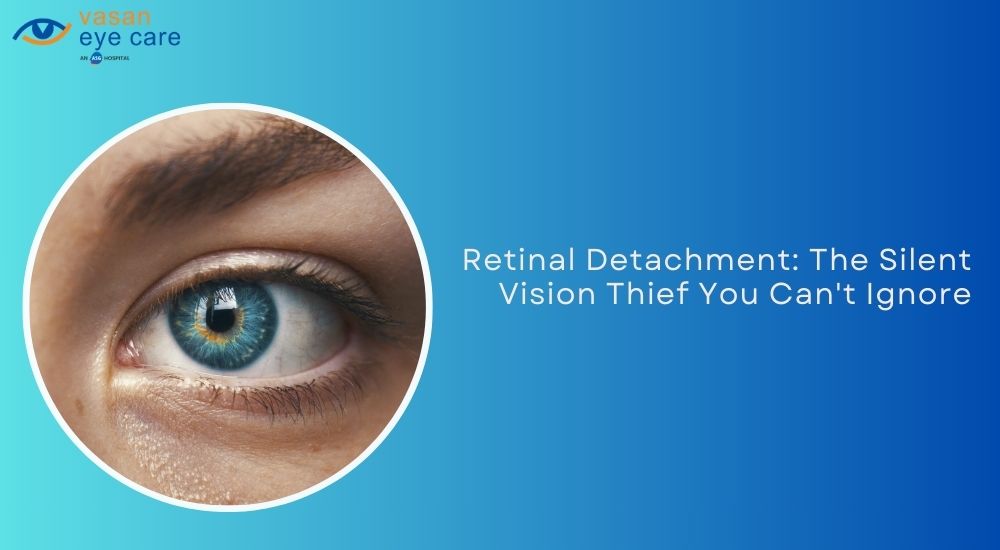Retinal Detachment is a serious eye problem where the retina (the light-sensitive layer at the back of the eye) pulls away from its normal position. If not treated quickly, it can lead to permanent vision loss. Many people ignore early signs, thinking it’s just tired eyes or minor irritation. But Retinal Detachment is an emergency – delaying treatment can make you blind.
In this blog, we explain:
✔ What is Retinal Detachment?
✔ Main causes & risk factors
✔ Warning signs & symptoms
✔ Different types of Retinal Detachment
✔ Treatment options (surgery & recovery)
✔ How to prevent vision loss
If you see sudden flashes, floaters, or dark shadows in your vision – visit an eye doctor immediately. Let’s understand this “silent vision thief” before it’s too late.
What is Retinal Detachment?
The retina is like a camera film inside your eye – it captures light and sends images to the brain. When the retina detaches (separates from the eye wall), it stops working properly. Without quick treatment, Retinal Detachment can cause permanent blindness.
Why Does Retinal Detachment Happen?
-
Aging (common after 50 years)
-
Eye injury (accidents, sports)
-
Diabetes (uncontrolled sugar damages retina)
-
Severe nearsightedness (high minus power)
-
Previous eye surgery (like cataract operation)
-
Family history (genetic risk)
Types of Retinal Detachment
There are 3 main types:
-
Rhegmatogenous Retinal Detachment (Most Common)
-
A small tear or hole in the retina allows fluid to leak underneath.
-
Needs urgent laser or surgery to seal the tear.
-
-
Tractional Retinal Detachment
-
Caused by scar tissue pulling the retina away (common in diabetic patients).
-
Requires vitrectomy surgery to remove scars.
-
-
Exudative Retinal Detachment
-
Fluid builds up under the retina due to inflammation or injury.
-
Treated with medicines or laser, not always surgery.
-
Warning Signs of Retinal Detachment
Never ignore these symptoms:
🔴 Sudden flashes of light (like lightning in vision)
🔴 New floaters (black spots or cobwebs moving in vision)
🔴 Dark shadow or curtain covering part of vision
🔴 Blurry or distorted vision (straight lines look bent)
🔴 Sudden vision loss (especially in one eye)
❌ Myth: “It will go away on its own.”
✅ Fact: Retinal Detachment is an emergency – delaying treatment increases blindness risk.
Who is at Risk?
You are more likely to get Retinal Detachment if you:
✔ Are above 50 years old
✔ Have high minus power (-6 or more)
✔ Had eye surgery (cataract, LASIK)
✔ Suffer from diabetes or high blood pressure
✔ Had a serious eye injury
✔ Have a family history of retinal problems
How is Retinal Detachment Treated?
The only treatment is surgery, and the sooner, the better. The type of surgery depends on the severity:
1. Laser Surgery (Photocoagulation)
-
Used for small tears before detachment.
-
Laser burns around the tear “weld” the retina back.
-
Quick, no cuts – done in the doctor’s clinic.
2. Freezing Treatment (Cryopexy)
-
A freezing probe seals the retina tear.
-
Used when laser isn’t possible.
3. Pneumatic Retinopexy (Gas Bubble Surgery)
-
A gas bubble is injected into the eye to push the retina back.
-
You must keep your head in a certain position for days.
4. Scleral Buckle Surgery
-
A silicone band is placed around the eye to support the retina.
-
Permanent solution for large detachments.
5. Vitrectomy (Most Common Surgery)
-
The gel inside the eye (vitreous) is removed and replaced with gas/oil.
-
Takes 1-2 hours, recovery in weeks.
Recovery Tips After Surgery:
-
Avoid heavy work, bending, or flying (if gas bubble used).
-
Use prescribed eye drops to prevent infection.
-
Wear an eye shield while sleeping.
-
Follow-up visits are must to check healing.
Can Retinal Detachment Be Prevented?
✅ Regular eye check-ups (once a year if high risk)
✅ Control diabetes & blood pressure
✅ Protect eyes from injury (wear safety goggles)
✅ See a doctor immediately if you see flashes/floaters
FAQs
1. Can Retinal Detachment heal without surgery?
❌ No! It always needs medical treatment. Delaying can cause blindness.
2. Is the surgery painful?
-
No, you’ll get local or general anesthesia. Mild discomfort may last a few days.
3. Will my vision return to normal?
-
Depends on how early you got treated. Some people regain full vision, others have partial improvement.
4. Can both eyes get Retinal Detachment?
-
Yes, but usually one eye first. High-risk patients should monitor both eyes.
5. How much does surgery cost in India?
-
₹30,000 to ₹1,50,000 depending on hospital & surgery type. Many insurance plans cover it.
Final Advice: Don’t Wait!
Retinal Detachment steals vision silently and quickly. If you see:
-
Flashes like lightning
-
New floaters
-
Dark shadows
👉 Visit an eye specialist (retina doctor) immediately.
The sooner you act, the more vision you save! Share this with family – it could save someone’s eyesight.
Need help?
📞 Call an eye hospital near you or book an online consultation. Early treatment = Better results!









